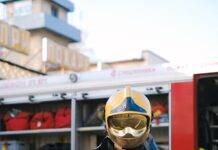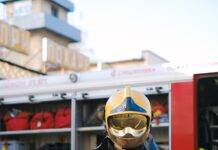
What is in Fire Sprinklers?
What is in Fire Sprinklers? : Fire sprinkler systems are an integral part of fire safety measures in buildings and structures, both residential and commercial. They are designed to detect and extinguish fires in their early stages, preventing the spread of flames and the potential for catastrophic damage. In this article, we will delve into the world of fire sprinklers, exploring how they work, their components, and their critical role in safeguarding lives and property.
The Components of a Fire Sprinkler System
Fire sprinkler systems consist of several key components:
- Main Water Supply: A reliable water source is essential for fire sprinklers to function. This source is typically the building’s municipal water supply or a dedicated water tank.
- Sprinkler Heads: These are the most visible part of the system. When the temperature in a room rises to a certain level, individual sprinkler heads release a stream of water to control or extinguish the fire.
- Piping System: A network of pipes connects the sprinkler heads to the water supply, ensuring the water reaches where it’s needed.
- Alarm and Control Valve: This component is responsible for monitoring the system and controlling the flow of water when a fire is detected.
How Do Fire Sprinklers Work?
The operation of a fire sprinkler system is relatively straightforward. When a fire starts, the air temperature in the vicinity of the fire rises, causing the nearest sprinkler head to release water. This localized response can effectively control the fire, preventing it from spreading. Contrary to popular belief, fire sprinklers don’t all activate simultaneously unless the fire is extensive and requires it.
Types of Fire Sprinkler Systems
There are several types of fire sprinkler systems, each tailored to specific needs:
- Wet Pipe System: The most common type, water is always present in the pipes, ready for immediate use.
- Dry Pipe System: Primarily used in areas prone to freezing temperatures, these systems contain pressurized air, which is replaced by water when a fire is detected.
- Pre-Action System: Requires two triggers before releasing water, reducing the risk of accidental discharges.
- Deluge System: Deluge systems release a large volume of water when activated, often used in high-hazard areas.
Fire Sprinkler Installation and Maintenance
Proper installation and regular maintenance are crucial to ensure fire sprinklers function correctly when needed. A certified technician should install the system, and routine inspections are necessary to identify any potential issues.
The Importance of Fire Sprinklers
Fire sprinklers play a pivotal role in fire safety for various reasons:
- Life Safety: They protect occupants by suppressing fires, giving them more time to escape.
- Property Protection: Fire sprinklers can significantly reduce property damage during a fire incident.
Myths and Misconceptions about Fire Sprinklers
There are several myths surrounding fire sprinklers, such as them activating accidentally or causing extensive water damage. However, modern systems are highly reliable and designed to minimize these concerns.
Advancements in Fire Sprinkler Technology
Technology has enhanced the efficiency of fire sprinkler systems. Innovations such as smart sprinklers, which use advanced sensors to detect fires, have made these systems even more effective.
Legal Regulations and Compliance
Many jurisdictions have specific regulations regarding fire sprinklers in commercial buildings. Compliance is essential to ensure the safety of occupants and avoid legal issues.
Choosing the Right Fire Sprinkler System
Selecting the appropriate fire sprinkler system depends on the building’s purpose, local regulations, and the specific hazards it may face.
What is the Use of Fire Sprinklers?
Hot Work Safety Toolbox Talk Meeting
What is Meaning of %LEL and %UEL
Common FAQs about Fire Sprinklers
- FAQ 1: Are fire sprinklers only found in commercial buildings?
- Answer: No, fire sprinklers are also used in residential properties to enhance fire safety.
- FAQ 2: Can fire sprinklers cause water damage to properties?
- Answer: While some water damage is possible, it’s far less than the damage caused by an uncontrolled fire.
- FAQ 3: How often should fire sprinkler systems be inspected?
- Answer: Regular inspections, at least annually, are crucial to ensure the system’s reliability.
- FAQ 4: Can I install fire sprinklers in my home?
- Answer: Yes, residential fire sprinkler systems are available and can enhance your home’s safety.
- FAQ 5: What’s the difference between smoke detectors and fire sprinklers?
- Answer: Smoke detectors alert you to the presence of smoke, while fire sprinklers actively suppress fires, providing a higher level of protection.
Conclusion: A Lifesaver in Disguise
Fire sprinkler systems are an unsung hero in the world of fire safety. Their ability to swiftly respond to fires, protect lives, and minimize property damage makes them an invaluable component of modern building safety.
























